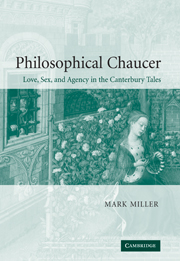Book contents
- Frontmatter
- Contents
- Acknowledgments
- Introduction: Chaucer and the problem of normativity
- Chapter 1 Naturalism and its discontents in the Miller's Tale
- Chapter 2 Normative longing in the Knight's Tale
- Chapter 3 Agency and dialectic in the Consolation of Philosophy
- Chapter 4 Sadomasochism and utopia in the Roman de la Rose
- Chapter 5 Suffering love in the Wife of Bath's Prologue and Tale
- Chapter 6 Love's promise: the Clerk's Tale and the scandal of the unconditional
- Notes
- Bibliography
- Index
Chapter 4 - Sadomasochism and utopia in the Roman de la Rose
Published online by Cambridge University Press: 22 September 2009
- Frontmatter
- Contents
- Acknowledgments
- Introduction: Chaucer and the problem of normativity
- Chapter 1 Naturalism and its discontents in the Miller's Tale
- Chapter 2 Normative longing in the Knight's Tale
- Chapter 3 Agency and dialectic in the Consolation of Philosophy
- Chapter 4 Sadomasochism and utopia in the Roman de la Rose
- Chapter 5 Suffering love in the Wife of Bath's Prologue and Tale
- Chapter 6 Love's promise: the Clerk's Tale and the scandal of the unconditional
- Notes
- Bibliography
- Index
Summary
The purpose of this chapter is to extend and elaborate two closely linked arguments from the previous chapter. The more local of the two arguments concerns a reading of the intellectual tradition within which Chaucer developed his interests in gender and sexuality and his sense of those interests as central to a project of philosophical poetry. The larger of the two arguments concerns the recovery of a medieval idiom for understanding psychological phenomena such as repression, fetishism, narcissism, sadism, and masochism. The two arguments dovetail in a resistance to taking either set of concerns as distinctively modern, or as requiring a modern conceptual apparatus such as psychoanalysis to understand. Rather than turning to speculative biology, traumatic narrative, any of the various developmental models of the psyche, or any of the various psychic topographies advanced by Freud or Lacan, my argument focuses on the perennial link the Christian tradition has made between problems of sexuality and problems of autonomy, a link which, as Peter Brown has argued, was central to Christian thinking about morality and sociality from Paul to Augustine, and which remained so throughout the Middle Ages and beyond. Partly to indicate the differences between the place of sexuality in this tradition and in psychoanalysis, in the previous chapter I bracketed sexuality completely, arguing that a sufficiently supple reading of dialectical form in Boethius's Consolation of Philosophy both provides a philosophical account of repression and fetishism and leads to the conclusion that agency is constitutively masochistic.
- Type
- Chapter
- Information
- Philosophical ChaucerLove, Sex, and Agency in the Canterbury Tales, pp. 152 - 190Publisher: Cambridge University PressPrint publication year: 2005

